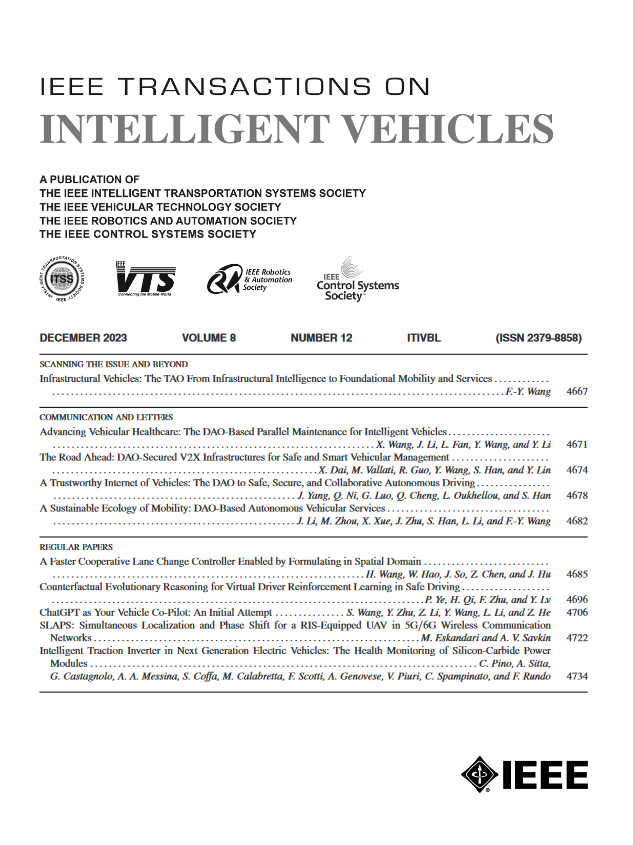面向密集交通中自动驾驶的主动交互时空后退地平线控制
IF 14.3
1区 工程技术
Q1 COMPUTER SCIENCE, ARTIFICIAL INTELLIGENCE
引用次数: 0
摘要
在密集的交通场景中,确保安全的同时保持高任务性能是自动驾驶的关键挑战。为了解决这一问题,本文提出了一种计算效率高的时空后退地平线控制(ST-RHC)方案,在控制空间中生成安全、动态可行、节能的轨迹,从而在密集交通中高精度、实时安全地完成不同的驾驶任务。特别是,考虑到主动交互,设计了一个具体化的时空安全屏障模块,以减轻由于其他车辆轨迹预测不准确造成的影响。随后,将运动规划与控制问题表述为约束非线性优化问题,有利于结合多次射击有效地利用现成的优化解。通过与最先进的算法在密集交通的合成和真实交通数据集上的综合比较,证明了所提出的ST-RHC方案的有效性,并在准确性、效率和安全性方面取得了优异的成绩。本文章由计算机程序翻译,如有差异,请以英文原文为准。
Spatiotemporal Receding Horizon Control With Proactive Interaction Towards Autonomous Driving in Dense Traffic
In dense traffic scenarios, ensuring safety while keeping high task performance for autonomous driving is a critical challenge. To address this problem, this paper proposes a computationally-efficient spatiotemporal receding horizon control (ST-RHC) scheme to generate a safe, dynamically feasible, energy-efficient trajectory in control space, where different driving tasks in dense traffic can be achieved with high accuracy and safety in real time. In particular, an embodied spatiotemporal safety barrier module considering proactive interactions is devised to mitigate the effects of inaccuracies resulting from the trajectory prediction of other vehicles. Subsequently, the motion planning and control problem is formulated as a constrained nonlinear optimization problem, which favorably facilitates the effective use of off-the-shelf optimization solvers in conjunction with multiple shooting. The effectiveness of the proposed ST-RHC scheme is demonstrated through comprehensive comparisons with state-of-the-art algorithms on synthetic and real-world traffic datasets under dense traffic, and the attendant outcome of superior performance in terms of accuracy, efficiency and safety is achieved.
求助全文
通过发布文献求助,成功后即可免费获取论文全文。
去求助
来源期刊

IEEE Transactions on Intelligent Vehicles
Mathematics-Control and Optimization
CiteScore
12.10
自引率
13.40%
发文量
177
期刊介绍:
The IEEE Transactions on Intelligent Vehicles (T-IV) is a premier platform for publishing peer-reviewed articles that present innovative research concepts, application results, significant theoretical findings, and application case studies in the field of intelligent vehicles. With a particular emphasis on automated vehicles within roadway environments, T-IV aims to raise awareness of pressing research and application challenges.
Our focus is on providing critical information to the intelligent vehicle community, serving as a dissemination vehicle for IEEE ITS Society members and others interested in learning about the state-of-the-art developments and progress in research and applications related to intelligent vehicles. Join us in advancing knowledge and innovation in this dynamic field.
 求助内容:
求助内容: 应助结果提醒方式:
应助结果提醒方式:


